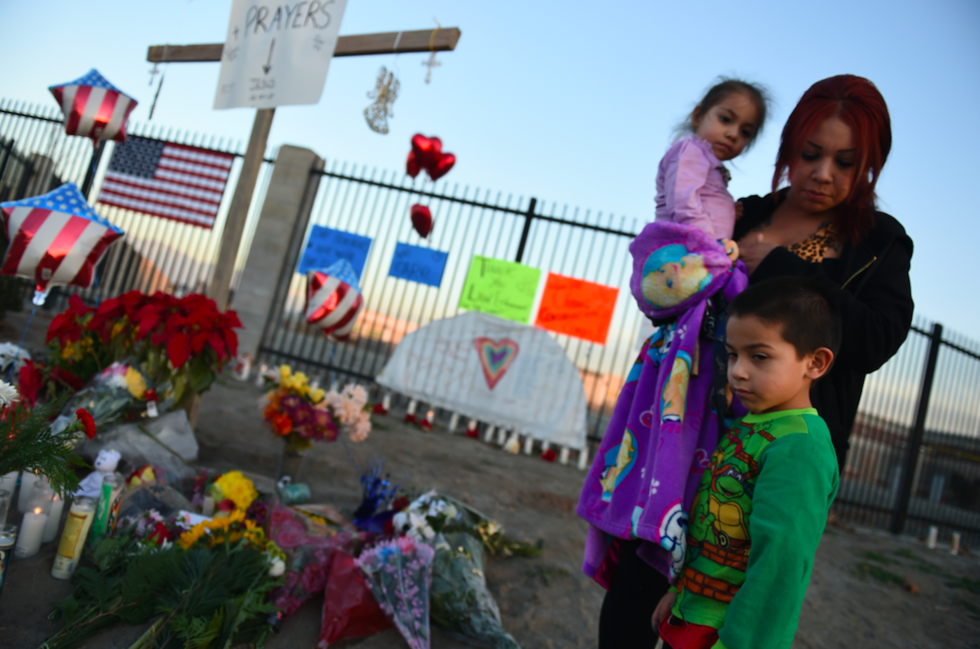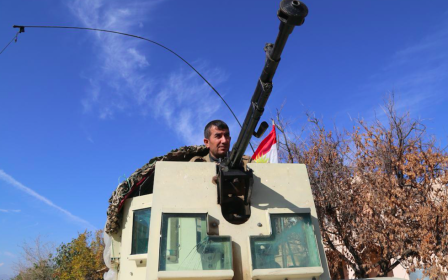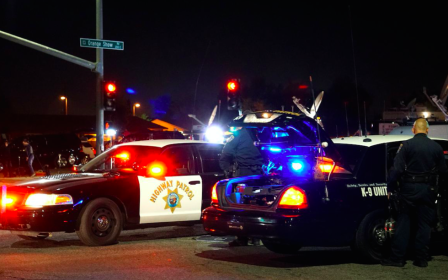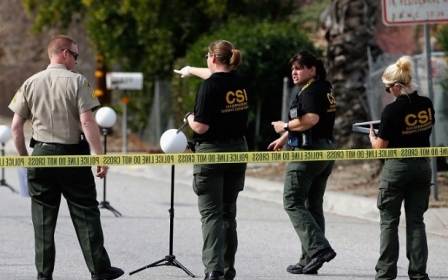To stop self-radicalisation, we need to stop the bombing

Investigators now believe the married couple that massacred 20 civilians in San Bernardino, California, had declared allegiance to the terror group the Islamic State. Indeed, yet another instance of self-radicalisation, and yet another example of life-long Muslims, without a history of demonstrative religious extremism, suddenly turning violent.
The husband hadn’t attended a mosque in more than two years. His family said that while he was devoted to his faith, the relationship was casual, rather than intense.
Equally the Paris attackers, for the most part, had a history of petty crime, drug and alcohol abuse, and promiscuous behavior – all of which hardly point to the piety demanded by Islamic fundamentalism.
So how are these Muslim individuals in Western countries self-radicalising?
What’s clear is this: friends and family are radicalising 95 percent of Western IS recruits. Mosques, Imams, and religious preachers play little or no part in radicalisation, according to Oxford University.
When I interviewed former jihadist and now counter violent extremism (CVE) expert Mubin Shaihk, he told me that Muslims in the West who become violently radicalised usually do so by spending hours online watching videos of suffering in the Muslim world. They watch videos of Israeli fighter jets bombing Gaza; US bombing schools, hospitals, and homes in Afghanistan, Iraq, Yemen, Somalia, Pakistan, etc.
These videos are a central component of IS’ propaganda. Shaihk says watching these videos, over and over, leads to the subconscious internalisation of an intoxicating mantra: “It isn’t right. It isn’t fair. It’s your fault. I must do something.”
CVE experts have described this self-radicalisation process “vicarious deprivation” and we see it time and time again – in cases from Boston to Woolwich; from Paris to San Bernardino.
Osman Hussain, who was arrested for attempting to trigger a bomb in London’s tube, told an Italian court: “Religion had nothing to do with this. We watched films. We were shown videos and images of the war in Iraq. We were told we must do something big. That’s why we met.”
If we stop the videos, we go a long way to stopping the terrorism. But to stop the videos, we must examine how our actions lead to the existence of said videos, which is something we already know. We know from where these videos gain life.
In the days following the September 11 attacks, US secretary of defense Donald Rumsfeld said we should “drain the swamp” where terrorism breeds. Yes, that’s what one of the Iraq invasion architects said, but that’s not, as we know, what the US actually did. By invading and occupying Iraq, the US only made the swamp bigger.
So on what fertile grounds does the terrorist insect thrive?
In 2004, Rumsfeld directed the Defense Science Board Task Force to answer that very question. Their report found that “negative attitudes” towards the US, and therefore the terrorist threat, is cultivated by “American direct intervention in the Muslim world”.
Specifically, the DSBTF identified “support for tyrannies in places like Egypt and Saudi Arabia,” US wars and occupations in the Middle East, and even more specific – “America’s one sided support in favor of Israel”.
Unsurprisingly, the report merely echoed Osama Bin Laden’s 2002 “Letter To America” – in which the al-Qaeda leader answered the question, “Why are we fighting and opposing you?”
Bin Laden states clearly: “Because you attacked us and continue to attack us. You attacked us in Palestine … You attacked us in Somalia.” He also cited US theft of natural resources in the Middle East, US military bases in Saudi Arabia, and US support of tyrannical dictators.
This is not an exercise in sympathising with a madman, but an exercise in understanding from where doth this self-radicalisation come. If we can’t appease legitimate political grievances in the Muslim world, we will always be confronted with a terror threat.
Six months after the September 11 attacks, the international polling firm Zogby International conducted face-to-face interviews throughout five Arab nations – Egypt, Saudi Arabia, Lebanon, Kuwait, and the UAE – to measure how Arabs felt about “the many ways that America manifested itself in the region and touched their lives".
Contrary to those who peddle the “clash of civilizations” narrative, “majorities in all countries were favorably inclined toward America’s democracy and freedom”. Where America’s overall favorability sank, however, is when Arabs are asked about US foreign policy in the Middle East. Nine out of 10 respondents gave the US a negative rating for its handling of the Palestine-Israel conflict - “an issue viewed uniformly as 'the most important' or 'a very important' concern facing the Arab world today”.
When respondents were asked, “What should America do to change its image in the Arab world?” nearly all focused on specific policy issues. “Stop killing Arabs, stop supporting Israel and change your Middle East policy," were among the most common responses.
So how is the US doing on all of those scores? The US continues to assist the bombing of Yemen, where according to Human Rights Watch more than 2,000 civilians have been killed. The US is also bombing in Iraq and Syria and ramping up its ground force in both countries. On Israel-Palestine, no one has been a better friend to Israel than President Barack Obama.
Resolving Palestinian statehood remains one of the most important pieces for solving the Islamic terrorism jigsaw puzzle. A full year prior to Bin Laden’s attack on America, then US presidential candidate Ralph Nader remarked: “There will be no peace in the Middle East until there is justice for the Palestinians.”
This week, the Speaker of the Arab Parliament, Ahmed bin Mohammed Al-Jarwan, told journalists that a fair resolution to the Palestinian issue will reduce global terrorism by as much as 80 percent.
While drying the terrorist swamp must include an end to all wars in the Middle East and an end to support for tyrannical dictatorships, ultimate victory in the War on Terror, if victory is defined as an end to Western targeted terrorist acts, is impossible without resolving these grievances.
Ultimately, we have one of two choices: either “dry the swamp” or accept that Islamic terrorism is the cost of maintaining the status quo.
- CJ Werleman is the author of Crucifying America (2013), God Hates You. Hate Him Back (2009), and Koran Curious (2011), and he is the host of Foreign Object. Follow him on twitter: @cjwerleman
The views expressed in this article belong to the author and do not necessarily reflect the editorial policy of Middle East Eye.
Photo Credit: Makeshift memorial for the victims of a mass shooting, by suspects Syed Farook and his wife Tashfeen Malik, on 4 December, 2015 in San Bernardino, California (AFP)
New MEE newsletter: Jerusalem Dispatch
Sign up to get the latest insights and analysis on Israel-Palestine, alongside Turkey Unpacked and other MEE newsletters
Middle East Eye delivers independent and unrivalled coverage and analysis of the Middle East, North Africa and beyond. To learn more about republishing this content and the associated fees, please fill out this form. More about MEE can be found here.





